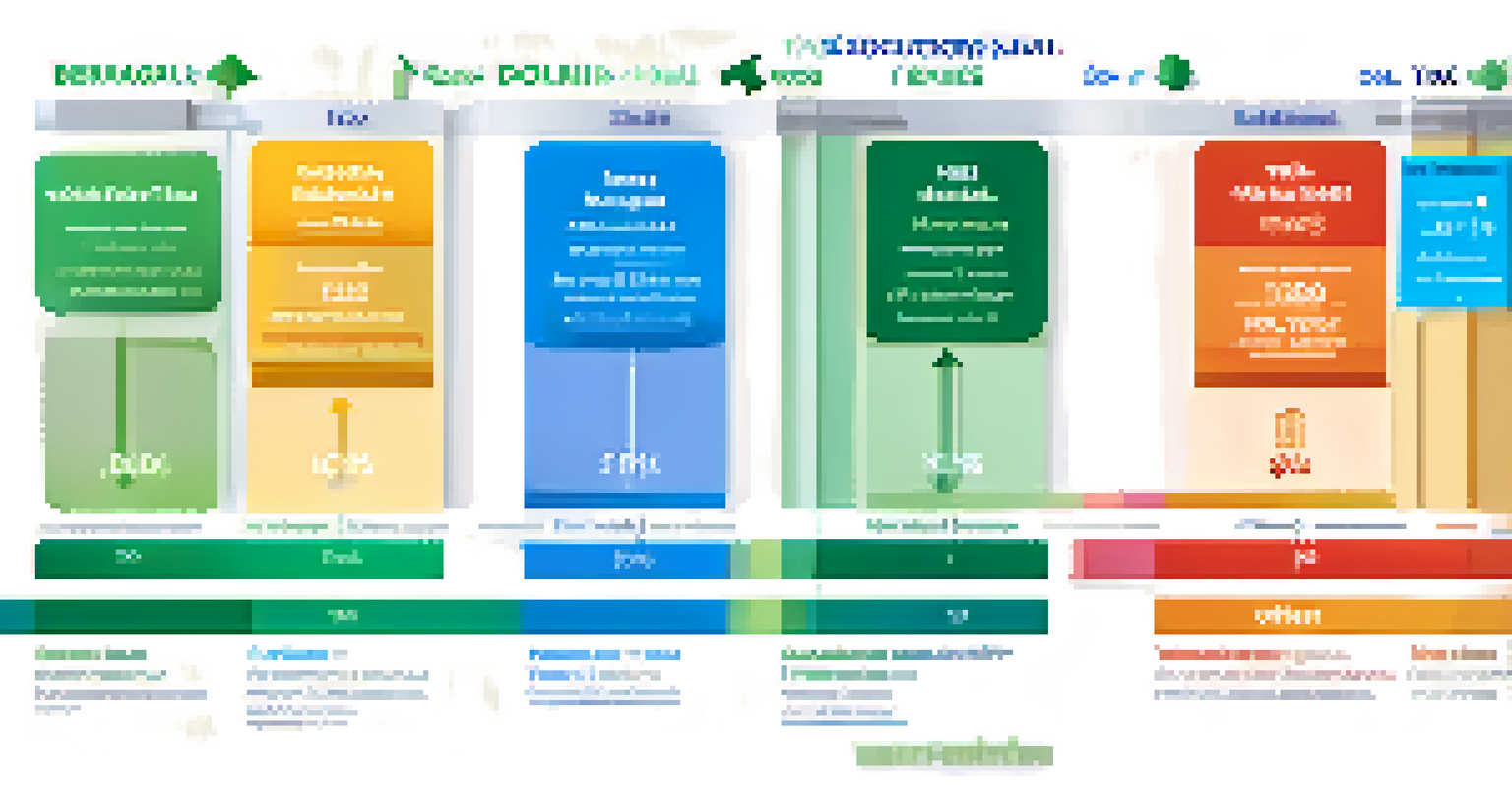Exploring State-Specific Tax Deductions: A Comprehensive Guide

Understanding State-Specific Tax Deductions
Tax deductions can vary significantly from one state to another, affecting how much you ultimately pay. Knowing the specifics of your state's tax laws is crucial for maximizing your deductions and minimizing your tax bill. Each state has its own rules, which can sometimes feel overwhelming, but breaking them down can make it manageable.
In this world, nothing can be said to be certain, except death and taxes.
For instance, while some states offer deductions for mortgage interest, others may provide benefits for property taxes or state-specific credits. Understanding these nuances can help taxpayers strategize their finances effectively. Keeping track of what your state offers can lead to significant savings over time.
In this guide, we’ll delve into various state-specific deductions, providing examples and tips to help you navigate your options. Whether you're a homeowner, a small business owner, or simply filing your taxes, this comprehensive overview will serve as a valuable resource.
Common Types of State Tax Deductions
State tax deductions come in various forms, with some being quite common across many states. For instance, deductions for mortgage interest and property taxes are prevalent and can offer substantial savings for homeowners. Additionally, many states provide deductions for state income taxes paid, which can significantly reduce your taxable income.

Other types of deductions may include those for medical expenses, charitable contributions, and education costs. Depending on your state's policies, these deductions can vary widely, so it's essential to research what applies to your situation. This variety highlights the importance of understanding your state's tax framework.
State Tax Deductions Vary Widely
Understanding the specific tax deductions available in your state is essential for maximizing savings and minimizing your tax bill.
By familiarizing yourself with the common deductions available, you can create a more effective tax strategy. These deductions can help you keep more of your hard-earned money, making it all the more worthwhile to explore your options.
State-Specific Deductions for Homeowners
Homeownership often comes with several tax benefits, particularly in the form of state-specific deductions. Many states allow homeowners to deduct property taxes, which can lead to significant savings, especially in areas with high property values. Additionally, some states offer deductions for mortgage interest, making homeownership more financially feasible.
The hardest thing in the world to understand is the income tax.
In some cases, states may also provide tax credits for energy-efficient home improvements, further incentivizing homeowners to invest in sustainable upgrades. This is not only beneficial for the environment but can also lead to additional financial benefits come tax season.
Understanding these deductions is key for homeowners looking to maximize their tax savings. It’s worth consulting with a tax professional to ensure you’re taking full advantage of what your state has to offer.
Deductions for Small Business Owners
Small business owners often face unique tax challenges, but many states offer specific deductions to help ease this burden. Common deductions include expenses for business equipment, travel, and even home office setups. These deductions can drastically reduce taxable income, making a significant difference in a small business's bottom line.
Some states also provide additional incentives for hiring employees, investing in local businesses, or even making environmentally friendly choices. By leveraging these state-specific deductions, business owners can reinvest the savings back into their operations, driving growth and sustainability.
Homeowners Can Save Significantly
Homeowners may benefit from deductions on property taxes and mortgage interest, which can lead to substantial savings.
It's crucial for small business owners to stay informed about both state and federal tax laws. Regularly reviewing these deductions can lead to better financial health and increased profitability for your business.
Tax Deductions for Education Expenses
Education-related expenses can also qualify for state-specific tax deductions, providing relief for families and students alike. Many states allow deductions for tuition, fees, and even certain educational supplies, helping to alleviate the financial burden of education. This can be especially beneficial for families with multiple children in school.
Additionally, some states offer deductions for student loan interest, making it easier for graduates to manage their debt. These deductions can lead to substantial savings over the years, especially for those pursuing higher education.
By taking advantage of these education-related deductions, taxpayers can make a significant impact on their overall financial situation. It’s always a good idea to consult with a tax professional to explore all available options.
Health-Related Tax Deductions by State
Health expenses can quickly add up, but many states offer tax deductions to help taxpayers manage these costs. Common deductions include medical expenses, long-term care premiums, and even health insurance premiums in certain circumstances. Each state's rules can vary, so it’s essential to understand what qualifies for deductions.
Some states may even provide additional credits for specific health-related expenses, such as preventive care or health savings accounts (HSAs). By leveraging these deductions, taxpayers can offset the high costs of healthcare and improve their overall financial situation.
Education Expenses Are Deductible
Many states offer tax deductions for education-related expenses, helping families reduce the financial burden of schooling.
Navigating health-related deductions can be complex, but understanding what your state offers is crucial. Keeping organized records of medical expenses can make claiming these deductions much smoother come tax time.
Navigating State Tax Laws: Resources and Tools
Navigating state tax laws can feel daunting, but several resources are available to help simplify the process. State tax agency websites often provide comprehensive information on available deductions, credits, and filing requirements. These official resources can be invaluable for understanding the specifics of your state's tax landscape.
Additionally, tax preparation software can guide you through the complexities of state-specific deductions. Many programs offer tailored questions and suggestions based on your location, helping you uncover potential savings. Consulting with a tax professional can also provide personalized advice, especially for unique situations.

By utilizing these resources, taxpayers can make informed decisions and ensure they’re maximizing their deductions. Staying proactive about tax planning can lead to significant financial benefits in the long run.
Conclusion: Maximizing Your State Tax Deductions
In conclusion, understanding state-specific tax deductions is essential for anyone looking to optimize their tax situation. By taking the time to research and familiarize yourself with available deductions, you can effectively reduce your taxable income and keep more money in your pocket. Whether you’re a homeowner, small business owner, or student, there are likely deductions available to you.
Remember, tax laws can change frequently, so it’s important to stay updated on any new developments in your state. Regularly reviewing your deductions and consulting with a tax professional can ensure you’re always in the best position possible to maximize your savings.
Ultimately, being proactive about your taxes can lead to substantial long-term benefits. By exploring and utilizing state-specific tax deductions, you can navigate the complexities of tax season with confidence and ease.